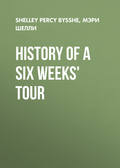
Мэри Шелли
The Last Man
"It is well," said Adrian, "to prate of war in these pleasant shades, and with much ill-spent oil make a show of joy, because many thousand of our fellow-creatures leave with pain this sweet air and natal earth. I shall not be suspected of being averse to the Greek cause; I know and feel its necessity; it is beyond every other a good cause. I have defended it with my sword, and was willing that my spirit should be breathed out in its defence; freedom is of more worth than life, and the Greeks do well to defend their privilege unto death. But let us not deceive ourselves. The Turks are men; each fibre, each limb is as feeling as our own, and every spasm, be it mental or bodily, is as truly felt in a Turk's heart or brain, as in a Greek's. The last action at which I was present was the taking of – . The Turks resisted to the last, the garrison perished on the ramparts, and we entered by assault. Every breathing creature within the walls was massacred. Think you, amidst the shrieks of violated innocence and helpless infancy, I did not feel in every nerve the cry of a fellow being? They were men and women, the sufferers, before they were Mahometans, and when they rise turbanless from the grave, in what except their good or evil actions will they be the better or worse than we? Two soldiers contended for a girl, whose rich dress and extreme beauty excited the brutal appetites of these wretches, who, perhaps good men among their families, were changed by the fury of the moment into incarnated evils. An old man, with a silver beard, decrepid and bald, he might be her grandfather, interposed to save her; the battle axe of one of them clove his skull. I rushed to her defence, but rage made them blind and deaf; they did not distinguish my Christian garb or heed my words – words were blunt weapons then, for while war cried "havoc," and murder gave fit echo, how could I —
Turn back the tide of ills, relieving wrong
With mild accost of soothing eloquence?
One of the fellows, enraged at my interference, struck me with his bayonet in the side, and I fell senseless.
"This wound will probably shorten my life, having shattered a frame, weak of itself. But I am content to die. I have learnt in Greece that one man, more or less, is of small import, while human bodies remain to fill up the thinned ranks of the soldiery; and that the identity of an individual may be overlooked, so that the muster roll contain its full numbers. All this has a different effect upon Raymond. He is able to contemplate the ideal of war, while I am sensible only to its realities. He is a soldier, a general. He can influence the blood-thirsty war-dogs, while I resist their propensities vainly. The cause is simple. Burke has said that, 'in all bodies those who would lead, must also, in a considerable degree, follow.' – I cannot follow; for I do not sympathize in their dreams of massacre and glory – to follow and to lead in such a career, is the natural bent of Raymond's mind. He is always successful, and bids fair, at the same time that he acquires high name and station for himself, to secure liberty, probably extended empire, to the Greeks."
Perdita's mind was not softened by this account. He, she thought, can be great and happy without me. Would that I also had a career! Would that I could freight some untried bark with all my hopes, energies, and desires, and launch it forth into the ocean of life – bound for some attainable point, with ambition or pleasure at the helm! But adverse winds detain me on shore; like Ulysses, I sit at the water's edge and weep. But my nerveless hands can neither fell the trees, nor smooth the planks. Under the influence of these melancholy thoughts, she became more than ever in love with sorrow. Yet Adrian's presence did some good; he at once broke through the law of silence observed concerning Raymond. At first she started from the unaccustomed sound; soon she got used to it and to love it, and she listened with avidity to the account of his achievements. Clara got rid also of her restraint; Adrian and she had been old playfellows; and now, as they walked or rode together, he yielded to her earnest entreaty, and repeated, for the hundredth time, some tale of her father's bravery, munificence, or justice.
Each vessel in the mean time brought exhilarating tidings from Greece. The presence of a friend in its armies and councils made us enter into the details with enthusiasm; and a short letter now and then from Raymond told us how he was engrossed by the interests of his adopted country. The Greeks were strongly attached to their commercial pursuits, and would have been satisfied with their present acquisitions, had not the Turks roused them by invasion. The patriots were victorious; a spirit of conquest was instilled; and already they looked on Constantinople as their own. Raymond rose perpetually in their estimation; but one man held a superior command to him in their armies. He was conspicuous for his conduct and choice of position in a battle fought in the plains of Thrace, on the banks of the Hebrus, which was to decide the fate of Islam. The Mahometans were defeated, and driven entirely from the country west of this river. The battle was sanguinary, the loss of the Turks apparently irreparable; the Greeks, in losing one man, forgot the nameless crowd strewed upon the bloody field, and they ceased to value themselves on a victory, which cost them – Raymond.
At the battle of Makri he had led the charge of cavalry, and pursued the fugitives even to the banks of the Hebrus. His favourite horse was found grazing by the margin of the tranquil river. It became a question whether he had fallen among the unrecognized; but no broken ornament or stained trapping betrayed his fate. It was suspected that the Turks, finding themselves possessed of so illustrious a captive, resolved to satisfy their cruelty rather than their avarice, and fearful of the interference of England, had come to the determination of concealing for ever the cold-blooded murder of the soldier they most hated and feared in the squadrons of their enemy.
Raymond was not forgotten in England. His abdication of the Protectorate had caused an unexampled sensation; and, when his magnificent and manly system was contrasted with the narrow views of succeeding politicians, the period of his elevation was referred to with sorrow. The perpetual recurrence of his name, joined to most honourable testimonials, in the Greek gazettes, kept up the interest he had excited. He seemed the favourite child of fortune, and his untimely loss eclipsed the world, and shewed forth the remnant of mankind with diminished lustre. They clung with eagerness to the hope held out that he might yet be alive. Their minister at Constantinople was urged to make the necessary perquisitions, and should his existence be ascertained, to demand his release. It was to be hoped that their efforts would succeed, and that though now a prisoner, the sport of cruelty and the mark of hate, he would be rescued from danger and restored to the happiness, power, and honour which he deserved.
The effect of this intelligence upon my sister was striking. She never for a moment credited the story of his death; she resolved instantly to go to Greece. Reasoning and persuasion were thrown away upon her; she would endure no hindrance, no delay. It may be advanced for a truth, that, if argument or entreaty can turn any one from a desperate purpose, whose motive and end depends on the strength of the affections only, then it is right so to turn them, since their docility shews, that neither the motive nor the end were of sufficient force to bear them through the obstacles attendant on their undertaking. If, on the contrary, they are proof against expostulation, this very steadiness is an omen of success; and it becomes the duty of those who love them, to assist in smoothing the obstructions in their path. Such sentiments actuated our little circle. Finding Perdita immoveable, we consulted as to the best means of furthering her purpose. She could not go alone to a country where she had no friends, where she might arrive only to hear the dreadful news, which must overwhelm her with grief and remorse. Adrian, whose health had always been weak, now suffered considerable aggravation of suffering from the effects of his wound. Idris could not endure to leave him in this state; nor was it right either to quit or take with us a young family for a journey of this description. I resolved at length to accompany Perdita. The separation from my Idris was painful – but necessity reconciled us to it in some degree: necessity and the hope of saving Raymond, and restoring him again to happiness and Perdita. No delay was to ensue. Two days after we came to our determination, we set out for Portsmouth, and embarked. The season was May, the weather stormless; we were promised a prosperous voyage. Cherishing the most fervent hopes, embarked on the waste ocean, we saw with delight the receding shore of Britain, and on the wings of desire outspeeded our well filled sails towards the South. The light curling waves bore us onward, and old ocean smiled at the freight of love and hope committed to his charge; it stroked gently its tempestuous plains, and the path was smoothed for us. Day and night the wind right aft, gave steady impulse to our keel – nor did rough gale, or treacherous sand, or destructive rock interpose an obstacle between my sister and the land which was to restore her to her first beloved,
Her dear heart's confessor – a heart within that heart.
VOL. II
CHAPTER I
DURING this voyage, when on calm evenings we conversed on deck, watching the glancing of the waves and the changeful appearances of the sky, I discovered the total revolution that the disasters of Raymond had wrought in the mind of my sister. Were they the same waters of love, which, lately cold and cutting as ice, repelling as that, now loosened from their frozen chains, flowed through the regions of her soul in gushing and grateful exuberance? She did not believe that he was dead, but she knew that he was in danger, and the hope of assisting in his liberation, and the idea of soothing by tenderness the ills that he might have undergone, elevated and harmonized the late jarring element of her being. I was not so sanguine as she as to the result of our voyage. She was not sanguine, but secure; and the expectation of seeing the lover she had banished, the husband, friend, heart's companion from whom she had long been alienated, wrapt her senses in delight, her mind in placidity. It was beginning life again; it was leaving barren sands for an abode of fertile beauty; it was a harbour after a tempest, an opiate after sleepless nights, a happy waking from a terrible dream.
Little Clara accompanied us; the poor child did not well understand what was going forward. She heard that we were bound for Greece, that she would see her father, and now, for the first time, she prattled of him to her mother.
On landing at Athens we found difficulties encrease upon us: nor could the storied earth or balmy atmosphere inspire us with enthusiasm or pleasure, while the fate of Raymond was in jeopardy. No man had ever excited so strong an interest in the public mind; this was apparent even among the phlegmatic English, from whom he had long been absent. The Athenians had expected their hero to return in triumph; the women had taught their children to lisp his name joined to thanksgiving; his manly beauty, his courage, his devotion to their cause, made him appear in their eyes almost as one of the ancient deities of the soil descended from their native Olympus to defend them. When they spoke of his probable death and certain captivity, tears streamed from their eyes; even as the women of Syria sorrowed for Adonis, did the wives and mothers of Greece lament our English Raymond – Athens was a city of mourning.
All these shews of despair struck Perdita with affright. With that sanguine but confused expectation, which desire engendered while she was at a distance from reality, she had formed an image in her mind of instantaneous change, when she should set her foot on Grecian shores. She fancied that Raymond would already be free, and that her tender attentions would come to entirely obliterate even the memory of his mischance. But his fate was still uncertain; she began to fear the worst, and to feel that her soul's hope was cast on a chance that might prove a blank. The wife and lovely child of Lord Raymond became objects of intense interest in Athens. The gates of their abode were besieged, audible prayers were breathed for his restoration; all these circumstances added to the dismay and fears of Perdita.
My exertions were unremitted: after a time I left Athens, and joined the army stationed at Kishan in Thrace. Bribery, threats, and intrigue, soon discovered the secret that Raymond was alive, a prisoner, suffering the most rigorous confinement and wanton cruelties. We put in movement every impulse of policy and money to redeem him from their hands.
The impatience of my sister's disposition now returned on her, awakened by repentance, sharpened by remorse. The very beauty of the Grecian climate, during the season of spring, added torture to her sensations. The unexampled loveliness of the flower-clad earth – the genial sunshine and grateful shade – the melody of the birds – the majesty of the woods – the splendour of the marble ruins – the clear effulgence of the stars by night – the combination of all that was exciting and voluptuous in this transcending land, by inspiring a quicker spirit of life and an added sensitiveness to every articulation of her frame, only gave edge to the poignancy of her grief. Each long hour was counted, and "He suffers" was the burthen of all her thoughts. She abstained from food; she lay on the bare earth, and, by such mimickry of his enforced torments, endeavoured to hold communion with his distant pain. I remembered in one of her harshest moments a quotation of mine had roused her to anger and disdain. "Perdita," I had said, "some day you will discover that you have done wrong in again casting Raymond on the thorns of life. When disappointment has sullied his beauty, when a soldier's hardships have bent his manly form, and loneliness made even triumph bitter to him, then you will repent; and regret for the irreparable change "will move In hearts all rocky now, the late remorse of love."1
The stinging "remorse of love" now pierced her heart. She accused herself of his journey to Greece – his dangers – his imprisonment. She pictured to herself the anguish of his solitude; she remembered with what eager delight he had in former days made her the partner of his joyful hopes – with what grateful affection he received her sympathy in his cares. She called to mind how often he had declared that solitude was to him the greatest of all evils, and how death itself was to him more full of fear and pain when he pictured to himself a lonely grave. "My best girl," he had said, "relieves me from these phantasies. United to her, cherished in her dear heart, never again shall I know the misery of finding myself alone. Even if I die before you, my Perdita, treasure up my ashes till yours may mingle with mine. It is a foolish sentiment for one who is not a materialist, yet, methinks, even in that dark cell, I may feel that my inanimate dust mingles with yours, and thus have a companion in decay." In her resentful mood, these expressions had been remembered with acrimony and disdain; they visited her in her softened hour, taking sleep from her eyes, all hope of rest from her uneasy mind.
Two months passed thus, when at last we obtained a promise of Raymond's release. Confinement and hardship had undermined his health; the Turks feared an accomplishment of the threats of the English government, if he died under their hands; they looked upon his recovery as impossible; they delivered him up as a dying man, willingly making over to us the rites of burial.
He came by sea from Constantinople to Athens. The wind, favourable to him, blew so strongly in shore, that we were unable, as we had at first intended, to meet him on his watery road. The watchtower of Athens was besieged by inquirers, each sail eagerly looked out for; till on the first of May the gallant frigate bore in sight, freighted with treasure more invaluable than the wealth which, piloted from Mexico, the vexed Pacific swallowed, or that was conveyed over its tranquil bosom to enrich the crown of Spain. At early dawn the vessel was discovered bearing in shore; it was conjectured that it would cast anchor about five miles from land. The news spread through Athens, and the whole city poured out at the gate of the Piraeus, down the roads, through the vineyards, the olive woods and plantations of fig-trees, towards the harbour. The noisy joy of the populace, the gaudy colours of their dress, the tumult of carriages and horses, the march of soldiers intermixed, the waving of banners and sound of martial music added to the high excitement of the scene; while round us reposed in solemn majesty the relics of antient time. To our right the Acropolis rose high, spectatress of a thousand changes, of ancient glory, Turkish slavery, and the restoration of dear-bought liberty; tombs and cenotaphs were strewed thick around, adorned by ever renewing vegetation; the mighty dead hovered over their monuments, and beheld in our enthusiasm and congregated numbers a renewal of the scenes in which they had been the actors. Perdita and Clara rode in a close carriage; I attended them on horseback. At length we arrived at the harbour; it was agitated by the outward swell of the sea; the beach, as far could be discerned, was covered by a moving multitude, which, urged by those behind toward the sea, again rushed back as the heavy waves with sullen roar burst close to them. I applied my glass, and could discern that the frigate had already cast anchor, fearful of the danger of approaching nearer to a lee shore: a boat was lowered; with a pang I saw that Raymond was unable to descend the vessel's side; he was let down in a chair, and lay wrapt in cloaks at the bottom of the boat.
I dismounted, and called to some sailors who were rowing about the harbour to pull up, and take me into their skiff; Perdita at the same moment alighted from her carriage – she seized my arm – "Take me with you," she cried; she was trembling and pale; Clara clung to her – "You must not," I said, "the sea is rough – he will soon be here – do you not see his boat?" The little bark to which I had beckoned had now pulled up; before I could stop her, Perdita, assisted by the sailors was in it – Clara followed her mother – a loud shout echoed from the crowd as we pulled out of the inner harbour; while my sister at the prow, had caught hold of one of the men who was using a glass, asking a thousand questions, careless of the spray that broke over her, deaf, sightless to all, except the little speck that, just visible on the top of the waves, evidently neared. We approached with all the speed six rowers could give; the orderly and picturesque dress of the soldiers on the beach, the sounds of exulting music, the stirring breeze and waving flags, the unchecked exclamations of the eager crowd, whose dark looks and foreign garb were purely eastern; the sight of temple-crowned rock, the white marble of the buildings glittering in the sun, and standing in bright relief against the dark ridge of lofty mountains beyond; the near roar of the sea, the splash of oars, and dash of spray, all steeped my soul in a delirium, unfelt, unimagined in the common course of common life. Trembling, I was unable to continue to look through the glass with which I had watched the motion of the crew, when the frigate's boat had first been launched. We rapidly drew near, so that at length the number and forms of those within could be discerned; its dark sides grew big, and the splash of its oars became audible: I could distinguish the languid form of my friend, as he half raised himself at our approach.
Perdita's questions had ceased; she leaned on my arm, panting with emotions too acute for tears – our men pulled alongside the other boat. As a last effort, my sister mustered her strength, her firmness; she stepped from one boat to the other, and then with a shriek she sprang towards Raymond, knelt at his side, and glueing her lips to the hand she seized, her face shrouded by her long hair, gave herself up to tears.
Raymond had somewhat raised himself at our approach, but it was with difficulty that he exerted himself even thus much. With sunken cheek and hollow eyes, pale and gaunt, how could I recognize the beloved of Perdita? I continued awe-struck and mute – he looked smilingly on the poor girl; the smile was his. A day of sun-shine falling on a dark valley, displays its before hidden characteristics; and now this smile, the same with which he first spoke love to Perdita, with which he had welcomed the protectorate, playing on his altered countenance, made me in my heart's core feel that this was Raymond.
He stretched out to me his other hand; I discerned the trace of manacles on his bared wrist. I heard my sister's sobs, and thought, happy are women who can weep, and in a passionate caress disburthen the oppression of their feelings; shame and habitual restraint hold back a man. I would have given worlds to have acted as in days of boyhood, have strained him to my breast, pressed his hand to my lips, and wept over him; my swelling heart choked me; the natural current would not be checked; the big rebellious tears gathered in my eyes; I turned aside, and they dropped in the sea – they came fast and faster; – yet I could hardly be ashamed, for I saw that the rough sailors were not unmoved, and Raymond's eyes alone were dry from among our crew. He lay in that blessed calm which convalescence always induces, enjoying in secure tranquillity his liberty and re-union with her whom he adored. Perdita at length subdued her burst of passion, and rose, – she looked round for Clara; the child frightened, not recognizing her father, and neglected by us, had crept to the other end of the boat; she came at her mother's call. Perdita presented her to Raymond; her first words were: "Beloved, embrace our child!"
"Come hither, sweet one," said her father, "do you not know me?" she knew his voice, and cast herself in his arms with half bashful but uncontrollable emotion.
Perceiving the weakness of Raymond, I was afraid of ill consequences from the pressure of the crowd on his landing. But they were awed as I had been, at the change of his appearance. The music died away, the shouts abruptly ended; the soldiers had cleared a space in which a carriage was drawn up. He was placed in it; Perdita and Clara entered with him, and his escort closed round it; a hollow murmur, akin to the roaring of the near waves, went through the multitude; they fell back as the carriage advanced, and fearful of injuring him they had come to welcome, by loud testimonies of joy, they satisfied themselves with bending in a low salaam as the carriage passed; it went slowly along the road of the Piraeus; passed by antique temple and heroic tomb, beneath the craggy rock of the citadel. The sound of the waves was left behind; that of the multitude continued at intervals, supressed and hoarse; and though, in the city, the houses, churches, and public buildings were decorated with tapestry and banners – though the soldiery lined the streets, and the inhabitants in thousands were assembled to give him hail, the same solemn silence prevailed, the soldiery presented arms, the banners vailed, many a white hand waved a streamer, and vainly sought to discern the hero in the vehicle, which, closed and encompassed by the city guards, drew him to the palace allotted for his abode.
Raymond was weak and exhausted, yet the interest he perceived to be excited on his account, filled him with proud pleasure. He was nearly killed with kindness. It is true, the populace retained themselves; but there arose a perpetual hum and bustle from the throng round the palace, which added to the noise of fireworks, the frequent explosion of arms, the tramp to and fro of horsemen and carriages, to which effervescence he was the focus, retarded his recovery. So we retired awhile to Eleusis, and here rest and tender care added each day to the strength of our invalid. The zealous attention of Perdita claimed the first rank in the causes which induced his rapid recovery; but the second was surely the delight he felt in the affection and good will of the Greeks. We are said to love much those whom we greatly benefit. Raymond had fought and conquered for the Athenians; he had suffered, on their account, peril, imprisonment, and hardship; their gratitude affected him deeply, and he inly vowed to unite his fate for ever to that of a people so enthusiastically devoted to him.
Social feeling and sympathy constituted a marked feature in my disposition. In early youth, the living drama acted around me, drew me heart and soul into its vortex. I was now conscious of a change. I loved, I hoped, I enjoyed; but there was something besides this. I was inquisitive as to the internal principles of action of those around me: anxious to read their thoughts justly, and for ever occupied in divining their inmost mind. All events, at the same time that they deeply interested me, arranged themselves in pictures before me. I gave the right place to every personage in the groupe, the just balance to every sentiment. This undercurrent of thought, often soothed me amidst distress, and even agony. It gave ideality to that, from which, taken in naked truth, the soul would have revolted: it bestowed pictorial colours on misery and disease, and not unfrequently relieved me from despair in deplorable changes. This faculty, or instinct, was now rouzed. I watched the re-awakened devotion of my sister; Clara's timid, but concentrated admiration of her father, and Raymond's appetite for renown, and sensitiveness to the demonstrations of affection of the Athenians. Attentively perusing this animated volume, I was the less surprised at the tale I read on the new-turned page.
The Turkish army were at this time besieging Rodosto; and the Greeks, hastening their preparations, and sending each day reinforcements, were on the eve of forcing the enemy to battle. Each people looked on the coming struggle as that which would be to a great degree decisive; as, in case of victory, the next step would be the siege of Constantinople by the Greeks. Raymond, being somewhat recovered, prepared to re-assume his command in the army.
Perdita did not oppose herself to his determination. She only stipulated to be permitted to accompany him. She had set down no rule of conduct for herself; but for her life she could not have opposed his slightest wish, or do other than acquiesce cheerfully in all his projects. One word, in truth, had alarmed her more than battles or sieges, during which she trusted Raymond's high command would exempt him from danger. That word, as yet it was not more to her, was PLAGUE. This enemy to the human race had begun early in June to raise its serpent-head on the shores of the Nile; parts of Asia, not usually subject to this evil, were infected. It was in Constantinople; but as each year that city experienced a like visitation, small attention was paid to those accounts which declared more people to have died there already, than usually made up the accustomed prey of the whole of the hotter months. However it might be, neither plague nor war could prevent Perdita from following her lord, or induce her to utter one objection to the plans which he proposed. To be near him, to be loved by him, to feel him again her own, was the limit of her desires. The object of her life was to do him pleasure: it had been so before, but with a difference. In past times, without thought or foresight she had made him happy, being so herself, and in any question of choice, consulted her own wishes, as being one with his. Now she sedulously put herself out of the question, sacrificing even her anxiety for his health and welfare to her resolve not to oppose any of his desires. Love of the Greek people, appetite for glory, and hatred of the barbarian government under which he had suffered even to the approach of death, stimulated him. He wished to repay the kindness of the Athenians, to keep alive the splendid associations connected with his name, and to eradicate from Europe a power which, while every other nation advanced in civilization, stood still, a monument of antique barbarism. Having effected the reunion of Raymond and Perdita, I was eager to return to England; but his earnest request, added to awakening curiosity, and an indefinable anxiety to behold the catastrophe, now apparently at hand, in the long drawn history of Grecian and Turkish warfare, induced me to consent to prolong until the autumn, the period of my residence in Greece.
As soon as the health of Raymond was sufficiently re-established, he prepared to join the Grecian camp, hear Kishan, a town of some importance, situated to the east of the Hebrus; in which Perdita and Clara were to remain until the event of the expected battle. We quitted Athens on the 2nd of June. Raymond had recovered from the gaunt and pallid looks of fever. If I no longer saw the fresh glow of youth on his matured countenance, if care had besieged his brow, "And dug deep trenches in his beauty's field," if his hair, slightly mingled with grey, and his look, considerate even in its eagerness, gave signs of added years and past sufferings, yet there was something irresistibly affecting in the sight of one, lately snatched from the grave, renewing his career, untamed by sickness or disaster. The Athenians saw in him, not as heretofore, the heroic boy or desperate man, who was ready to die for them; but the prudent commander, who for their sakes was careful of his life, and could make his own warrior-propensities second to the scheme of conduct policy might point out.







